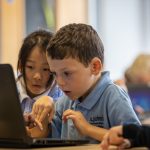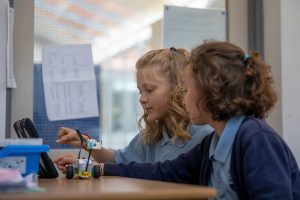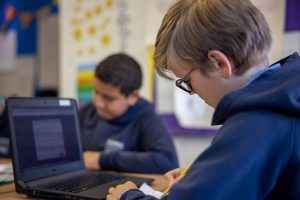Ethos and Aims
Computing and technological advances continue to dramatically change the way we live.
To create citizens of the future, Computing at St. John’s ensures children are equipped with computational thinking skills and creativity to prepare them for life in an ever-changing digital world.
It aims to highlight the immense power of technology to solve problems, to be creative, digitally literate and inspire the next generation of computer users and programmers.
Computing Vision Statement
“Computer science empowers students to create the world of tomorrow.” (Satya Nadella, CEO, Microsoft)
To create adventurous citizens of the future, Computing at St. John’s ensures children are equipped with computational thinking skills and creativity to prepare them for life in an ever-changing digital world. It aims to highlight the unlimited power of technology to solve problems, to be creative, digitally literate and inspire the next generation of computer users and programmers.
Children enjoy experimenting with coding and learning from their mistakes to achieve success. Knowledge is built up year-on-year, challenging their thinking and problem solving skills to create and develop some complex games.
Being in Bristol, we are inspired by many local technology, computing and robotics companies. We strive to make children aware of possible careers in the dynamic field of Computing and the wider STEM subjects.
We support children to be digital citizens who recognise both the benefits and challenges of an ever-changing digital world through online safety discussions. Lessons guide them to consider their own safety and responsibility to contribute positively to an online society.
 Curriculum
Curriculum
In Computing lessons, from Year 1 to Year 6, children are taught the National Curriculum in an engaging, cross-curricular way.
They learn to code using child friendly languages such as Scratch and Swift Playground. Knowledge is built up year-on-year, challenging their thinking and problem solving skills to create and develop some complex games. Using Lego WeDo, children can even build and then code their very own Lego robot with a distance and tilt sensor, to solve real world problems. Children collect scientific data and use technology to draw and analyse graphs. They learn to film and then edit their own videos and also take and edit photos using a green screen.
At St. John’s, we recognise the importance of Computing being an integral part of learning in all subjects.
Each class has 6 iPads which are regularly used across the broader school curriculum. We also have several class sets of Chrome Books and laptops. Children use this technology to review and recommend books to each other, practice their skills on Mathematics apps and create their own books on Book Creator. Furthermore, children write assignments on them and carry out research for their Science, History or Geography projects.
Being in Bristol, we are inspired by many local technology, computing and robotics companies. Making links is important to us and we have had visitors from Bristol University and Reach Robotics, who both brought in their cutting-edge robots. These hands-on workshops inspire children and make them aware of possible careers in the dynamic field of Computing and the wider STEM subjects.
 Online Safety
Online Safety
We recognise both the benefits and challenges that digital learning brings to children and therefore take seriously our duty to educate pupils in how to utilise technology safely.
In addition to our Computing Leader, we also have an Online Safety Leader and Online Safety Committee who meet regularly and provide advice to parents responding to issues as they arise. Further information is available on our safeguarding page.
Throughout the year, children are taught to be safe and responsible online, as each Computing unit contains messages and questions about online safety. We also have a specific Online Safety Week each year and take part in the global ‘Safer Internet Day’ every February. Many of these activities are led by the children and encourage discussion about topics and issues.
